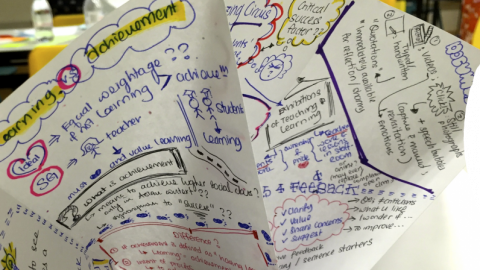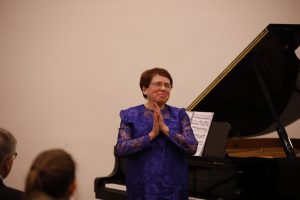From the Principal

“The mind is not a vessel to be filled, but a fire to be kindled”
Mestrius Plutarch
Along with a select group of teachers at St Catherine’s, I have enjoyed the opportunity to undertake a Harvard University online course in the Cultures of Thinking methodology this semester. Leading our Study Group was Senior School Philosophy, Literature and English Teacher, Miss Kristy Forrest, in her newly appointed role as Pedagogical Coach. Through this study, the Cultures of Thinking methodology was applied to the classroom repertoire of individual teachers in our group – Ms Julia West (Media), Mrs Mary Hugh (Chinese), Ms Vasiliki Spanos (English), Mr Alex Borlenghi (Humanities) and Ms Anna Pianezze (French).
Emanating through the long running Project Zero Research at Harvard, the Cultures of Thinking focus is on making classroom thinking more visible, effectively requiring teachers to facilitate learning whereby students are encouraged to think for themselves and to develop their intellectual curiosity to explore, reflect and form valued opinions.
In a heavily content driven Victorian curriculum, a process of learning that requires merely memorising and recall leads to a level of superficiality in student responses in assessment items. The key concept of the Cultures of Thinking methodology is that ‘learning is a consequence of thinking’. Simple routines adopted in the classroom aim to provide a sequence to step students through a deeper thinking process.
One example of a Thinking Routine adopted this Term across a variety of subjects included the approach of See/Think/Wonder. In this Thinking Routine, students are stepped through a process whereby in See we aim to capture student observation, asking students to look, perceive and notice; during Think they are being encouraged to interpret, connect, synthesise, and analyse; and Wonder prompts students to question, research, theorise, and argue. The key concept for teachers is to provide a balance between facilitating thinking with teaching content and delivery of information, or perhaps better phrased as the ‘tension’ between covering curriculum versus providing time to model and encourage thinking.
In a recently released article in the Harvard Business Review, author, Ulrich Boser highlights the commonly held misconception that the ability to learn is a matter of intelligence.
“And that’s why many people tend to approach the topic of learning without much focus. They don’t think much about how they will develop an area of mastery. They use phrases like “practice makes perfect” without really considering the learning strategy at play. It’s a remarkably ill-defined expression, after all. Does practice mean repeating the same skill over and over again? Does practice require feedback? Should practice be hard? Or should it be fun?
A growing body of research is making it clear that learners are made, not born. Through the deliberate use of practice and dedicated strategies to improve our ability to learn, we can all develop expertise faster and more effectively. In short, we can all get better at getting better.
One example of a study showed how learning strategies can be more important than raw smarts when it comes to gaining expertise. It was found that people who closely track their thinking will outscore others who have sky-high IQ levels when it comes to learning something new. The research suggests that in terms of developing mastery, focusing on how we understand is some 15 percentage points more important than innate intelligence.”
Encouraging students to ‘think about thinking’ is considered crucial to the talent of learning. Otherwise known as ‘metacognition’ and defined as ‘thinking about thinking’ or broadly speaking, metacognition is about being more inspective about how you know what you know. It is a matter of asking ourselves questions such as: Do I really get this idea? Could I explain it to a friend? What are my goals? Do I need more background knowledge? Or do I need more practice?
“Metacognition comes easily to many trained experts. When a specialist works through an issue, they’ll often think a lot about how the problem is framed. They will often have a good sense of whether or not their answer seems reasonable. The key, it turns out, is not to leave this sort of ‘thinking about thinking’ to the experts. When it comes to learning, one of the biggest issues is that people don’t engage in metacognition enough. They don’t stop to ask themselves if they really get a skill or concept. The issue, then, is not that something goes in one ear and out the other. The issue is that individuals don’t dwell on the dwelling. They don’t push themselves to really think about their thinking.”
The Harvard study has provided opportunity for our study group to reflect on the thinking dispositions we wish to cultivate and instil in our students. Some of the observations for this semester by our teachers include providing a safe environment for students to take intellectual risks is paramount to the class space; the quieter, less verbal, and/or less confident students are making their ideas known and students who may need longer processing time have had more opportunities to reflect and teachers could see the benefit in their responses. Finally, a noticeable shift in our understanding of what it means to be a ‘good student’—while there is certainly value in arriving at correct answers (in the case that there are ‘correct answers’), we also recognised that good questions are equally important to promoting and exhibiting understanding.
Reference: Boser, U. 2018 ‘Learning Is a Behaviour. Here’s How to Get Better at it’ 2 May 2018
Celebrating 40 Years of Music
 This week, it was a great pleasure to acknowledge and thank St Catherine’s piano teacher, Mrs Sofya Vainer, for her 40 years of outstanding service to St Catherine’s School and, in particular, her exceptional contribution to the Music Department. Sofya joined the Music Department in February 1978. During this time, she has served under five Principals, after initially being appointed by Ms Dorothy Pizzey. Many in our community will have known Sofya for many years and it is lovely to have her presence around Sherren House where she always exudes warmth, friendliness and happiness.
This week, it was a great pleasure to acknowledge and thank St Catherine’s piano teacher, Mrs Sofya Vainer, for her 40 years of outstanding service to St Catherine’s School and, in particular, her exceptional contribution to the Music Department. Sofya joined the Music Department in February 1978. During this time, she has served under five Principals, after initially being appointed by Ms Dorothy Pizzey. Many in our community will have known Sofya for many years and it is lovely to have her presence around Sherren House where she always exudes warmth, friendliness and happiness.
Having the privilege to hear Sofya play the piano on a number of occasions at our School Assembly and again this week at the School Staff Concert, the audience always enjoy a deeply transcending experience. Sofya is indeed an amazing artist and, through her performances, she has moved many people with her music. On behalf of the School community, I wholeheartedly congratulate Sofya on her wonderful contribution to St Catherine’s School and the many students who have learnt to play piano under her tutelage.
The concert also featured Sofya’s colleagues, Mr Andrew Wrigglesworth (Weeping Willows), Mr Dean Hilson (Melbourne Ska Orchestra), Mr Michael Dahlenburg (Symphony Services International Conductor Program), Mr Saska Ayris (Tiasu), Mr Robin Henry (MSO) and Mrs Lisa Cook (LSO).


